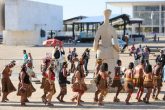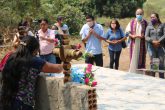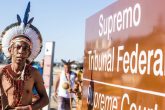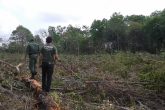Report No. 922: Leaders unite in opposition to criminalization process in Bahia
Since the arrest of Rosivaldo Ferreira da Silva, known as cacique (chief) Babau, leader of the Serra do Padeiro community of the Tupinambá people in the municipality of Buerarema, Bahia (BA), the indigenous peoples in the southern region of the state have been living in fear and virtually imprisoned in their villages. Students in the community have not been attending classes (high school) since March, the month in which Babau was taken from his home in the middle of the night by Federal Police.
There have been constant threats to the indigenous people made by farm owners, gunmen and even the general population. The leaders found it necessary to suspend travel by students to schools because of recurrent personal threats and threats to burn the school bus that transports them. Youth who attend college had to suspend course work because they were being threatened within their own classrooms.
Tired of waiting for a solution that never comes, the indigenous leaders of the region decided to unite and seek immediate answers from the state and federal governments. On Monday, July 12, nearly 300 leaders engaged an encampment in the Legislative Assembly of Bahia and the Department of Justice, in Salvador.
They demand a stop to the constant attacks of which they have been victims and that are often carried out by the Federal Police, the agency that is supposed to guarantee their safety. They are further calling for an end to the process of criminalization of the struggle of indigenous peoples seeking the recognition and demarcation of their traditional territories.
The legal struggle for the release of Tupinambá leaders
On the morning of July 15, a commission of Pataxó Hã Hã Hãe and Tupinambá leaders met with the President of the Tribunal of Justice of Bahia (TJBA), Dr. Telma Britto. During the meeting, they talked about the increasing process of criminalization against the indigenous people of the state, a situation resulting from the struggle for possession of their traditional territories. They demonstrated to the president the cultural importance of their lands, which are a source of material and spiritual life.
Sensitized with the presentation made by the indigenous representatives, the president of TJBA understood the necessity to expedite the habeas corpus related to the struggle of the Tupinambá People filed with the Tribunal, as well as new habeas corpus petitions filed today, one of which was filed by Cimi.
The committee also spoke with the judge rapporteur for the habeas corpus filings, Dr. Jeffeson Alves de Assis. According to the magistrate, the first Habeas Corpus filed by Funai is being reviewed by the Ministério Público (office of the federal prosecutor). He said that if the MP issues an opinion by early next week, the HCs could be judged on Thursday, July 22nd .
Department of Justice
On July 12, a delegation of these indigenous leaders met with the Secretary of Justice of Bahia, Lucina Tannue and with State Undersecretary of Public Safety, Ary Pereira. On that occasion, Pereira proposed holding a public hearing in Buerarema to clarify this situation with the population of this municipality, with the objective of putting an end to the practice of incitement against the indigenous people of the region. The practice of incitement has been spearheaded by farm owners and also by the local press.
Also participating in the meeting were law student Patricia Pataxó, who recently participated in the UN Conference defending the rights of indigenous peoples; representatives of the Indigenous Missionary Council (Cimi), the Pastoral Land Commission (CPT), the Movement for Landless Workers (MST), and the Forum of Struggle for Land Labour and the organization for Citizens of the Cocoa Region
The Under Secretary assured the delegation that investigations would be carried out to verify the denunciations made by representatives of the community of Serra do Padeiro of involvement by civil police in the attempt to assassinate cacique Babau and other representatives of his family. He also said that if necessary a contingent of policemen will be deployed to ensure the community the right to come and go, which according to reports, is trapped within their area.
For the leaders it is revolting to observe how the Federal Police have acted with the indigenous communities. "We must put a stop to this situation. We are being treated as dangerous criminals when the real criminals are out there, perpetrating this and nothing is done with them", he said.
According to the leaders there are omissions in the discovery process of investigations of complaints, and indifference on the part of the government regarding claims of indigenous peoples in the state. "What also revolts us is that the denunciations are made, irregularities in the actions are documented, and nothing concrete is done. An example of this situation is the arrest of the cacique Babau, his brothers and sister, which have been plagued by irregularities and despite this, they remain in custody. We want them to be released!". "They were arbitrarily arrested for defending an indigenous land that is in the final process of demarcation", said Andrade Tainã Tupinambá.






